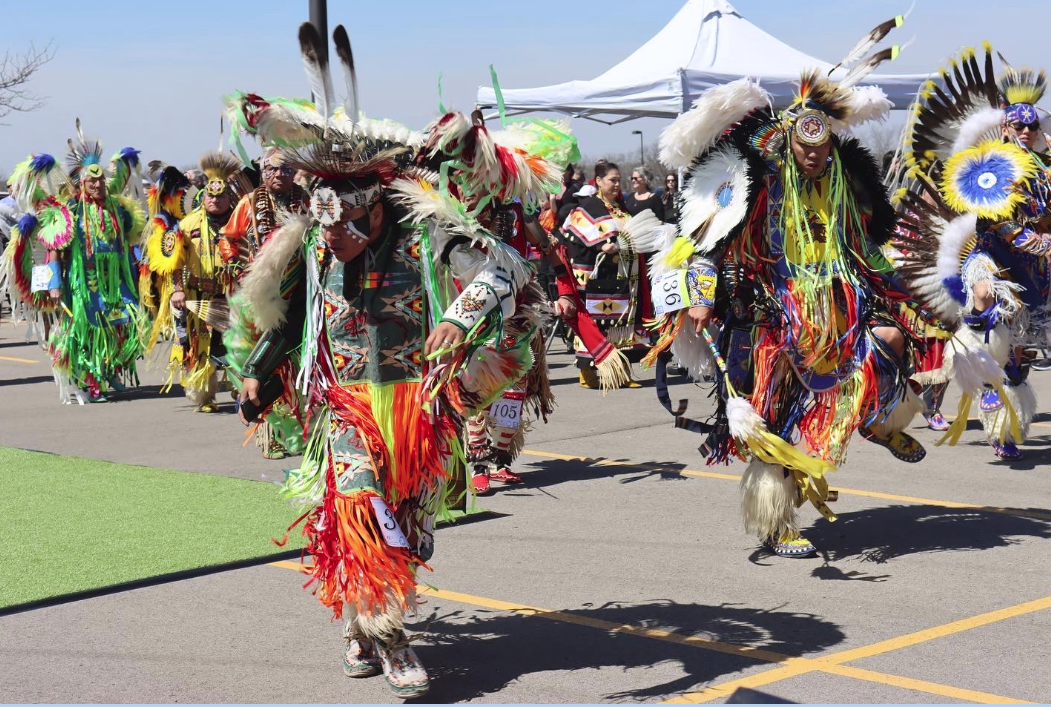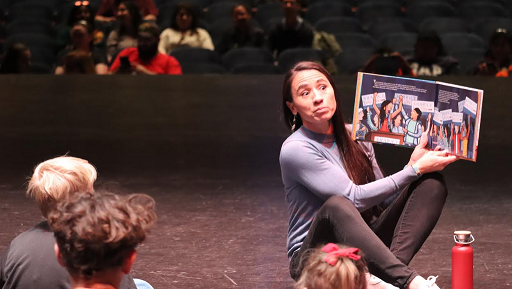
- Details
- By Darren Thompson
LAWRENCE, Kan. — The University of Kansas’s First Nations Student Association (FNSA) hosted its 33rd annual powwow and 5th annual Indigenous Cultures Festival at the University's Lied Center on Saturday, April 9 to a crowd that numbered in the thousands.
The powwow featured more than 100 registered dancers, the Haskell Color Guard, and several drum groups including Southern Boyz (Lawton, Okla.) as the host drum, Motown Singers (Red Lake, Minn.) as invited drum, Moose Hill and Jesse St. John, Crow Creek Dakota as the powwow’s Master of Ceremonies. The powwow grounds had dozens of vendors selling art, crafts, clothing, food, and other merchandise. Due to space needed for the entire day’s event, the powwow was hosted outside in the parking lot.
“COVID-19 interrupted a lot of our plans and wasn’t sure if the powwow would happen this year,” said KU Powwow Master of Ceremonies Jesse St. John to Native News Online. “It was a privilege to be asked again this year.”
The Indigenous Cultures Festival is a free community event that runs in conjunction with the FNSA Powwow, The festival featured demonstrations, presentations, hand games, book readings, and discussions on education by various American Indian presenters including U.S. Rep. Sharice Davids (D-KS), who represents Kansas' 3rd congressional district.

Rep. Davids, who is a tribal citizen of the Ho-Chunk Nation, read her book, “Sharice’s Big Voice: a Native Kid Becomes a Congresswoman,” co-authored with Nancy K. Mays to a group of youth on the Lied Center’s main stage. Her book tells her personal story of how Davids was one of the first Native American women elected to Congress, and the first LGBTQ congressperson to represent Kansas.
The evening’s grand entry featured an honor song for Rep. Davids, with many joining the powwow circle to shake the congresswoman’s hand. University of Kansas’s Director of Basketball Operations Fred Quartlebaum also made an appearance with the NCAA Men’s Basketball Trophy, allowing people to see and take pictures with the trophy that was won on Monday against the University of North Carolina.
“As a basketball announcer and a powwow MC, it was awesome to announce at the University of Kansas, especially as they are the National Champions this year,” said St. John. “Once in a lifetime opportunity to even be in the presence of the [National Championship] trophy.”
Organizers said that it’s possible that next year’s powwow will have its own grounds on the University’s campus due to the growing of the event.
Photos by Darren Thompson
-
 Haskell Color Guard Haskell Color Guard
Haskell Color Guard Haskell Color Guard -
 Women's jingle dress dancers Women's jingle dress dancers
Women's jingle dress dancers Women's jingle dress dancers -
 Men's traditional dancers Men's traditional dancers
Men's traditional dancers Men's traditional dancers -
 U.S. Rep. Sharice Davids was invited to the powwow circle U.S. Rep. Sharice Davids was invited to the powwow circle
U.S. Rep. Sharice Davids was invited to the powwow circle U.S. Rep. Sharice Davids was invited to the powwow circle -
 The NCAA Men's Basketball championship trophy The NCAA Men's Basketball championship trophy
The NCAA Men's Basketball championship trophy The NCAA Men's Basketball championship trophy
https://www.nativenewsonline.net/currents/ku-s-first-nations-student-association-hosts-33rd-annual-powwow-indigenous-cultures-festival#sigProId1fcb9661e0
More Stories Like This
Native News Weekly (August 25, 2024): D.C. BriefsScope Narrowed, Report Withheld: Questions Mount Over Michigan Boarding School Study
Zuni Youth Enrichment Project Announces Family Engagement Night and Spring Break Youth Programming
Next on Native Bidaské: Leonard Peltier Reflects on His First Year After Prison
Deb Haaland Rolls Out Affordability Agenda in Albuquerque
Help us defend tribal sovereignty.
At Native News Online, our mission is rooted in telling the stories that strengthen sovereignty and uplift Indigenous voices — not just at year’s end, but every single day.
Because of your generosity last year, we were able to keep our reporters on the ground in tribal communities, at national gatherings and in the halls of Congress — covering the issues that matter most to Indian Country: sovereignty, culture, education, health and economic opportunity.
That support sustained us through a tough year in 2025. Now, as we look to the year ahead, we need your help right now to ensure warrior journalism remains strong — reporting that defends tribal sovereignty, amplifies Native truth, and holds power accountable.
 The stakes couldn't be higher. Your support keeps Native voices heard, Native stories told and Native sovereignty defended.
The stakes couldn't be higher. Your support keeps Native voices heard, Native stories told and Native sovereignty defended.
Stand with Warrior Journalism today.
Levi Rickert (Potawatomi), Editor & Publisher

